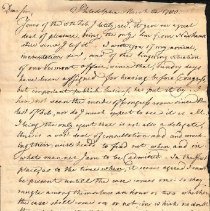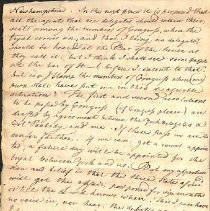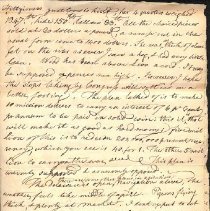Archive Record
Images



Metadata
Catalog Number |
MS050 B02 F16.02 |
Title |
Samuel Livermore to John Langdon |
Scope & Content |
Three page letter from Samuel Livermore in Philadelphia to John Langdon in Portsmouth. Samuel Livermore, 1732-1803, was Attorney-General for New Hampshire and subsequently, a U.S. Representative and a U.S. Senator from New Hampshire. He writes from Philadelphia about the goings-on at the Continental Congress, where he was the only agent not also a delegate. He reports that he has not seen the inside of the Congress building for two weeks, "nor do I much expect to see it at all." There is, he says, "a vast deal of consultation and wrecking their wise heads to find out when (underscored) and in what manner (underscored) I am to be admitted." He mentions the "lingering situation of our Vermont affair" (Vermont was an independent republic and not recognized by the Continental Congress because of objections from New York, which had conflicting property claims). He appears to be in Philadelphia to participate in the resolution of this affair because he confides that "it seems agreed I can be present untill the case comes on" - though no one knows when the case will come on. Massachusetts Bay, Connecticut and Rhode Island are not ready to discuss the matter yet, even though, he says, from these three states "every man except one" are strong Vermonters. He addsa that "my spirits rise as the casue opens, and I think still to get the better, in the end, but not this trip." He has been put in a disagreeable situation by his state, he says, so how can he blame the mebers of Congress for it - he means that as an agent, but not a delegate, he cannot take a seat among the mebers of Congress, but "should be heard at the Bar of the house, as they call it" (which he says he will not do). The first and second resolulions have been drafted by the York delegates [he always calls New York state "York"] & Colonel Peabody and himself. If these pass Congress, they will confer further and hope to get an appointment for a trial. But he fears the three states (Massachusetts Bay, Connecticut and Rhode Island ) will get the affair postponed for six months. Livermore mentions a petition from a number of towns about Cohoss (Coos county, NH) presented by Col. Alcot and Mr. Woodward. As far as other news goes, he says, things look good as far as France, Spain, Ireland, Carolina, Georgia and Florida go. The worst thing is the currency problem, which is bad. Hay costs £200 Pennsylvania money a ton, beef costs $5, 6 and 8 a pound. Hiltzimer's great cow is killed and all the choice pieces were sold at $20 a pound. Wood has been above £100 a cord. He hopes that the steps being taken by Congress will set things on a better footing. [Continental currency depreciated severeley during the Revolutionary War [hence the phrase "not worth a continental"] and the post-war economy was devastated. This was largely as a result of inflation stemming from the government's printing of large amounts of currency, in their effort to meet the monetary demands of the war. A primary problem was that monetary policy was not coordinated between Congress and the states, which continued to issue bills of credit.] The weather feels like the middle of April, the Delaware is open and navigation alive, and "pigeons flying thick and plenty at market." He does not expect to set out till near April. Dated March 14, 1780. |
Collection |
John Langdon Papers |
Object Name |
Letter |
Date |
March 14, 1780 |
People |
Langdon, John, 1741-1819 Livermore, Samuel, 1732-1803 Peabody, Stephen (Col.), 1742-1780 |
Search Terms |
Philadelphia |
Subjects |
Vermont Negotiating New York Massachusetts Bay Colony Connecticut Continental Congress Agents Delegates Borders (between states) Coos County Currency |
